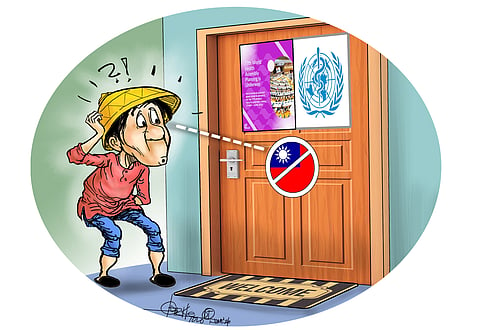
- NEWS
- the EDIT
- COMMENTARY
- BUSINESS
- LIFE
- SHOW
- ACTION
- GLOBAL GOALS
- SNAPS
- DYARYO TIRADA
- MORE

The World Health Organization’s (WHO) exclusion of Taiwan from the fight against the Covid-19 pandemic then despite Taiwan’s beyond superb response in addressing the plague, and its continued refusal now to allow Taiwan any involvement in WHO meetings, particularly this year’s World Health Assembly (WHA) in Switzerland, even if only as an observer, is a gross dereliction of duty on the part of the UN body supposedly dedicated to global health and safety.
Members of the Taiwanese community in Manila went out to the streets recently, calling for support for Taiwan’s efforts to be invited by the WHO to participate in this year’s WHA, the world’s highest health policy-setting body comprised of health ministers from WHO’s 194 member states.
They underscored that the 77th WHA, ongoing since 28 May in Geneva, Switzerland, has for its theme “All for Health, Health for All.” All, that is, except Taiwan. Why? Because China, the superpower that, it’s been widely said, was largely responsible for the election of the current WHO head, Tedros Adhanom Ghebreyesus, said so.
In a 2020 paper published by the Council for Foreign Relations, Yu-Jie Chen, then a global academic fellow at Hong Kong University’s Faculty of Law and now a research professor at Taiwan’s Academica Sinica, and Jerome Cohen, a CFR senior fellow, New York University law professor and founding director of the US-Asia Law Institute, said it squarely: “The world could learn from Taiwan’s success in responding to the coronavirus pandemic, yet it doesn’t have a seat at the WHO despite its invaluable inputs against the unprecedented health crisis.”
WHO’s bias for China and against Taiwan was made clear in the two intellectuals’ papers for the CFR.
On 31 December 2020, they recall, the Taiwanese government, alarmed by the developments happening in Wuhan, the Chinese city where coronavirus-19 first reared its deadly head, conveyed its concerns to the WHO about the virus’s potential for human-to-human transmission.
“But Taiwan received no reply. Instead, the WHO endorsed China’s denial of human–to–human transmission until 21 January.”
While the WHO appeared to have downplayed the global threat, Taiwan, according to Yu-Jie Chen and Cohen, gave out masks by the millions to its citizens, and adopted vigorous measures for screening, testing, contact tracing and enforcing quarantines.
“Those measures were aided by technology and big data as well as the cooperation of citizens who remained vigilant due to their traumatic Severe Acute Respiratory Syndrome experience in 2003.”
Crucially important in Taiwan’s response to the viral pandemic was transparency and open information, which “starkly contrasts with China’s initial cover-ups of the outbreak and its continued suppression of independent reporting.”
The paper’s authors pointed out that Taiwan’s experience and success in dealing with the pandemic rebuts the “misleading narrative” that only “countries with draconian powers” can effectively combat the virus.
Despite that, we see the sorry spectacle of a WHO crumbling to pressure from the Chinese.
Succumbing to Chinese pressure, the United Nations expelled Taiwan and recognized the People’s Republic of China (PRC) as the “legitimate representative of China.” Taiwan left the WHO in 1971.
Since then, Taiwan has been barred from attending the WHA even as an observer on the strength of sustained diplomatic pressure from China, except from 2009 to 2016, when Taiwan’s Kuomintang president, Ma Ying-jeon, was friendly with and acceptable to China.
In 2017, staunch “One China” oppositionist, Tsai Ing-wen, became president of Taiwan, and China once again blocked the democratically independent island’s presence in the annual WHA.
Year after year, Taiwan, with support from various countries sympathetic to its cause, has urged WHO to allow it to share its strides in healthcare and the medical field.
Regularly, Taiwan is a global front-runner in national healthcare system evaluations, ranking first among 110 countries surveyed in the 2023 edition of CEOWORLD magazine’s Health Care Index.
For the fifth year this year, it has retained its top ranking in the Health Care Index released by international database firm Numbeo.
Yu-Jie Chen and Jerome Cohen, in their paper, put it bluntly: “Taiwan’s exclusion is an example of how WHO, the world’s health body, puts politics before public health.”
Further, they pulled no punches when they asked “governments and concerned citizens (to) demand that the WHO fulfill its obligation — to represent the world’s health interests — and not China’s — and hold the WHO accountable when it fails.”
